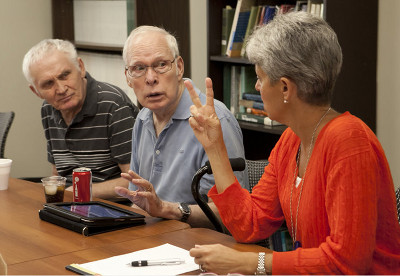
June is National Aphasia Awareness Month, and the scientists and staff at Moss Rehabilitation Research Institute (MRRI) are dedicated to helping raise awareness and improve our scientific understanding of aphasia. Aphasia is a language disorder affecting a person’s ability to communicate, and it can arise after stroke or other brain injury. MRRI is home to world-class scientists who are studying aphasia and developing novel therapies that can help people with aphasia.
MRRI has a rich history of groundbreaking research in aphasia. In 1992, Myrna F. Schwartz, PhD, co-founded Moss Rehabilitation Research Institute with former MRRI Director John Whyte, MD, PhD. Dr. Schwartz is one of the world’s most influential researchers of aphasia, and her pioneering research was continually funded by the National Institutes of Health for over 30 years. In addition, Dr. Schwartz was instrumental in creating the MRRI Research Participant Registry which helps scientists recruit research volunteers and track them over time. Scientists at MRRI continue to depend on the Research Participant Registry for the important work they are doing today.
Over the course of her career, she has published well over 100 peer-reviewed scientific articles, developed important tools and approaches for diagnosing and studying aphasia, and helped diagnose and treat hundreds of patients recovering from stroke and other types of brain injury. Her ground-breaking studies have been published in highly-regarded scientific journals, and they have supported and informed research around the world. Beyond her immense contributions to research, Dr. Schwartz has a lifelong passion to help people with aphasia and their caregivers live life to the fullest. In support of this passion, Dr. Schwartz helped found the MossRehab Aphasia Center, one of the first Aphasia Centers in the country. The mission of the Center is to help people with aphasia participate in life activities and maintain a high quality of life despite chronic language problems. The team at the MossRehab Aphasia Center does this by providing social opportunities, advanced assessment, and programs to improve personal and environmental factors.
For example, the Constance Sheerr-Kittner Conversation Cafés are an important part of programming at the MossRehab Aphasia Center. Each week, Conversation Café participants share stories and everyday experiences, as well as engage in topical discussions and debates. Sessions are facilitated by a speech-language pathologist, and they provide people with aphasia with an environment where they feel comfortable practicing communication strategies. Our Conversation Cafés also give participants a chance to make connections and develop friendships that extend beyond the Aphasia Center. Early evidence suggests that quality of life and the effectiveness of functional communication both improve in people with aphasia who participate in conversation groups. Ongoing research at MRRI is examining the impacts of long-term participation in our Conversation Café program.
Dr. Myrna Schwartz continues study aphasia as an emeritus Institute Scientist, and she provides important mentorship to other scientists at MRRI. Among the scientists who have benefited from her valuable guidance are MRRI Associate Director Laurel J. Buxbaum, PsyD, MossRehab Aphasia Center Director Sharon Antonucci, PhD, CCC-SLP, and MRRI Institute Scientist Erica L. Middleton, PhD.
Dr. Erica Middleton and MRRI Postdoctoral Fellow Marja Liisa Mailend, PhD, were recently awarded a research grant from the Albert Einstein Society to test and improve a promising treatment technique for people with chronic aphasia. This technique is called speech entertainment, and it involves speaking in unison with a model speaker by imitating the model in real time. Studies have shown that speech entertainment can provide dramatic improvements in speech output in people with aphasia. Drs. Middleton and Mailend look forward to helping determine the conditions that may lead to greater benefits from speech entertainment as well as understanding whether speech entertainment may continue to improve independent speech after practice. This research project is important for informing future research and helping to optimize a promising clinical treatment for aphasia.
MRRI researchers have left a lasting impact on the field of aphasia research, and their exceptional work continues to provide new insights into aphasia and novel approaches to treatment for those with aphasia.